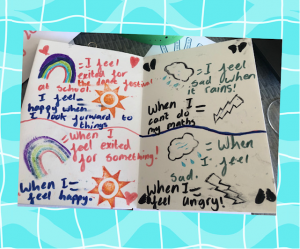
Sharing our expertise through pioneering improvement work
Is life story work working?
How should life story work support children and their families?

Sarah Taylor, Head of Coram’s Impact and Evaluation Team, reflects on a recent Coram conference on models of life story work and their outcomes
Social workers, researchers, therapists and others gathered recently on Coram’s Bloomsbury campus to share new evidence and ideas on how life story work can and should be used to support children, young people and families.
Coram believes that life story work is essential to help children who have been separated from their birth family to make sense of their past, as well as to explore their present and future, and the charity has been a pioneer in life story work. Members of the Coram Group – CoramBAAF, Coram Adoption, Coram’s creative therapies team, and my own Impact and Evaluation team, have all played a role in driving forward life story work. Another part of the Coram Group illustrates the need for this work: Coram Voice’s Bright Spots survey finds that up to around half of younger children, aged 4 to 7, do not fully understand why they are in care.
Just as every life story is different and changes over time, the stories we heard from speakers varied. They described different tools and modes: from creative methods to traditional books to different kinds of conversations and even in-depth therapeutic interventions. CoramBAAF’s Hedwig Verhagen described how Coram is delivering training on the use of objects to create greater equity in life story work, through professionals showing and telling about objects, to share information about themselves in a safe and accessible way. This work builds on a pilot that was evaluated by Coram’s evaluation team in 2021.
We heard from independent social worker and researcher Polly Baynes, who brought an international perspective following her Churchill Fellowship in Australia. Polly discussed the different family structures in Aboriginal Australian communities – the key people will vary in different people’s life stories. Polly discussed the ongoing reckoning taking place around the removal of Indigenous children from their birth families, questioning who has the ownership of social capital in these histories and how this is starting to be re-claimed.
Speakers challenged and questioned assumptions in the theory and practice of life story work regarding who has ownership of a child’s story. Social researcher Hannah Lawrence reflected on her recent research with adoptive parents on ‘life story talk’, discussing how feelings of narrative control and ownership change over the course of their adoptive journey.

Artwork from the Creative Life Story Work project
Professor Richard Rose and Jenny Young from Blue Cabin detailed their creative life story work practice, explaining how a creative approach can place the child front and centre as a producer and creator of their own story, imbuing them with a sense of agency that their early experiences may have eroded. Coram’s evaluation of the model, implemented in Darlington, Gateshead and South Tyneside councils, will be published later this autumn by What Works for Children’s Social Care.
Another Sarah Taylor, a Senior Social Worker specialising in post-adoption support, shared her experience of delivering Life Story Work for the Coram-led regional adoption agency Ambitious for Adoption. Sarah encouraged professionals and carers to be open to relinquishing control, accepting that there are answers that they do not have, and shifting the focus to hearing and recognising a child’s feelings.
Coram often acts as a convenor, bringing together different perspectives and disciplines. In many disciplines, bringing together different models can feel siloed and competitive. However speakers and attendees seemed to find commonality in their shared values, goals, and dedication to improving outcomes for children. This allowed for differences in approaches to be opportunities for learning as opposed to grounds for disagreement. Presentations were interspersed with lively question and answer sessions, a dialogue which we hope will continue.
The event was generously funded by the Hadley Trust.